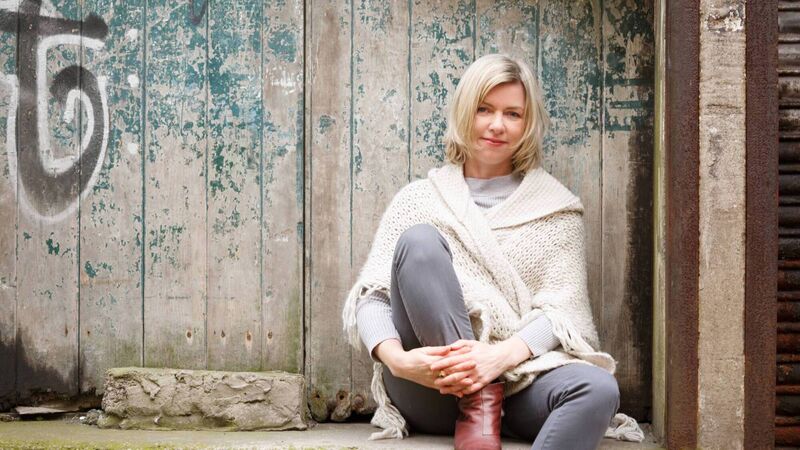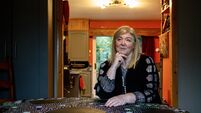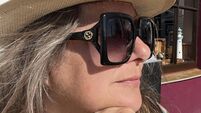Award winning Cork writer launches debut novel

Author Danielle McLaughlin.
The couple and their daughter, Jennifer, live in a splendid house in Sunday’s Well, but all is not well. Family life has been marred by Philip’s infidelity, causing teenage Jennifer to misbehave and, oddly, to blame her mother for what has traumatised the household.
The bourgeois milieu that Danielle captures so astutely was chosen because it’s what she’s is familiar with.
“It’s interesting to watch,” she says.
"But growing up, I wouldn’t have thought in terms of middle-class or working class or anything like. I had very much a 1970s rural Ireland childhood growing up in Donoughmore, north Cork.”

Danielle is married to a solicitor originally from Donegal. They have three children, Ellie, 18, Áine 16 and Rory, 14.
While studying law, and practising it in Waterford, Dublin and Cork, was something that Danielle was passionate about, she had to give it up when she became ill in 2009.
She had always dabbled in writing. In 2010, at the Cork International Short Story Festival, Danielle attended a workshop given by Lory Manrique-Hyland. It was a turning point for her.
She went on to write her acclaimed short story collection, . She has also had a couple of stories published in the New Yorker. And her story, won the Audible Short Story Award in 2019, worth £30,000. She was also awarded the Windham-Campbell Prize, worth $165,000. These prestigious awards were affirmation for this former solicitor. And the money was handy too.
“I had turned fifty. It was a long time since I had practised law which was my dream job when I was young. I was thinking what should I be doing with my life? I was having a bit of a psychological wobble about what I was doing. It was very nice to have the satisfaction (of the awards.)”

Danielle, who has written a second novel that has yet to be sent out to publishers, has clearly found her niche. She is a perfectionist when it comes to sending her writing out into the world, often writing up to 50 drafts of a short story.
“I didn’t write that many drafts of my novel. I still did a lot of drafts but I stopped counting them. I just kept writing, sending the work back and forth to my agent and publisher until everyone was happy with it.”
Danielle worked for years on . It is a finely wrought exploration of emotions and psychological states. While Nessa tries to forgive her husband for his affair, her past catches up with her.
“Through a chance encounter with someone she used to share a flat with, she is brought back into contact with a group of people, including a former lover for whom she betrayed her best friend. This may have led to the friend’s suicide.
The novel is also about Nessa’s curatorial project, which involves acquiring the personal effects and the remaining unsold works of a famous deceased sculptor, Robert Locke. The piece de resistance is a piece entitled , a portrayal of a pregnant woman which became a symbol of fertility. Desperate women, trying to conceive, would pitch up at Robert’s former home where his widow and daughter live. However, Nessa’s project is put in danger when a foreign woman called Melanie turns up claiming that she was the inspiration for and not Robert’s pregnant wife.
The art world interests Danielle.
“I would have done art in the Leaving Cert but I had no real talent for art. I passed because I was good at writing about the artists. I like wandering around art galleries. In a way, I’m outside it. It interests me the way people look at art and talk about art.
Writer Roddy Doyle, in a comment on the sleeve of the novel, observed that “is a gripping novel and a sharp, entertaining examination of the nature of art and its power to inspire and corrupt”.
Danielle says that we often think of visual artists “as these amazing creatures that are somehow exceptionally brilliant humans and can do no wrong. I think there can be a danger that when we put people on pedestals like that, we don’t question them in the way that we should.”
The Melanie character wants to be credited as the inspiration for .
“I like Melanie. She is someone who has been hard done by because of the way that art can come to corrupt. Melanie is odd. Maybe her oddness makes people less likely to believe her. But people shouldn’t discount odd people just because they’re a bit strange and different.”
The character of Nessa is complex. She is a survivor but she also has a self destructive streak. In a pointer towards her incorrigible middle-class status, Danielle writes that Nessa wants to do her weekly shop ‘discreetly’ in an Aldi store in a country town she finds herself in. She doesn’t want to be seen scrimping on spending money. However, there is a reason for Nessa’s desire to be frugal. Her husband borrowed a lot of money and spent it on investments that didn’t work out.
Danielle, while a paid up member of the middle-classes, is “very much a committed Aldi shopper. I go to Dunnes for anything I can’t get in Aldi. But Aldi is my number one. I’m sounding like an advertisement for Aldi! it’s like product placement. But Aldi saves me a fortune.”
Danielle, who along with writer, Madeleine D’Arcy, runs the monthly literary event called ‘Fiction at the Friary’, credits a teacher for encouraging her to write. She went to St Mary’s in Mallow.
“It’s some distance from Donoughmore but my dad worked in the offices of the Irish Sugar Company in Mallow, so I used to get a lift there.
“In my early years of secondary school, I had a lovely English teacher called Miss Higgins.
“I remember how encouraging she was about a short story I wrote. She was really nice about it.
Despite being a self-described introvert, Danielle isn’t all that keen on lockdown.
“I thought I’d fly through it and that it wouldn’t make that much difference to me. I thought I’d be fine locked away from the world.
“But I have to say that it gets me down as time goes on. it just goes to show that we need more human contact than we think we do.
“People like me would be very much living the quiet life. But I’ve been finding lockdown quite unsettling.”
Even introverts, particularly introverted writers, need people — both for company and for inspiration.
by Danielle McLaughlin is published by John Murray, Trade Paperback.







 App?
App?


